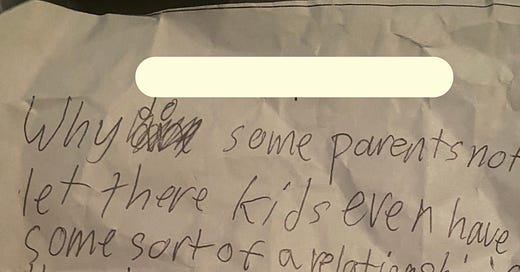Why do some parents not let their kids even have some sort of relationship if they know how it feels to be in love too, especially if they know that person loves the other person with all their heart?
When I was teaching sixth grade sex ed, this was one of the best questions I was asked. I keep it flattened in a folder next to my passport, social security card and other essential documents. Anonymous questions are one of the most sacred parts of a sex education class. Students are asked to write a burning question on a blank piece of paper and drop it into a shoe box. At the end of class, I would read all the questions and answer them on the spot.
In training to be a sex educator, you’re taught to answer these questions formulaically. You try not to express your personal opinions, you encourage universal values and you stick to the facts. New educators are encouraged to not go off script and to find many of the answers from an online chat bot like Planned Parenthood’s Roo (if you didn’t catch last month’s newsletter, you can read more here on my chat bot thoughts). As I had more experience as an educator, my favorite questions were the ones that didn’t have straightforward fact-based answers and started with “Why?”
I got the above question at a time when I was questioning my sexuality and whether I had ever really been in love. When I read this question, I saw images in my head of this young person begging her parents for a chance to pursue a love that she knew was real and felt sure compared to the love her parents felt for each other. One of the best parts about this question was that it seemed she had witnessed a truly expansive love between her parents.
One of the hallmarks of being a queer millennial like myself is to be a sort of a late bloomer when compared to the savvy expressiveness of queer middle and high schoolers I got to teach in sex ed. In 2007, when I was about the age of this question asker, there weren’t cozy YA queer friends-to-lovers novels that provided you some instruction to navigate the hidden make outs or the legs tangled all night sleepovers of closeted girlhood.
Whenever someone comes out, there can be a real period of mourning for the time before their queerness was fully realized. When reading this question in the classroom, I felt such envy and celebration (there should be a word that can capture both because they can be felt in the same breath) for this young girl who felt so sure that what she was feeling at 11 or 12 was real, true love. More than anything, that assuredness is what was missing from my queer youth. The romantic feelings I had were often covered in doubt and placed in a shadowy corner of female friendship.
Anyway, if I answered her today (in the classroom or in an outside world of a substack) I would say…
Q: Why do parents not let their kids even have some sort of a relationship if they know how it feels to be in love too, especially if they know that person loves the other person with all their heart.
A: This is such a good question and I’m so glad the writer felt comfortable asking it. For some parents, it’s totally fine for their children to fall in love and have relationships when they’re in middle school and high school. For other parents, their kids aren’t allowed to have romantic relationships when they’re young. The first step to figuring out what your parents think is asking them. You could ask something like - when do you think it’s okay for a kid to have a romantic relationship? How do you define a romantic relationship?
Once you figure out where they stand and why. You could then have a conversation and find out what ways it would be possible for you to explore this romantic relationship. During this conversation, it might be helpful to share with your parents the things about their relationship that you find so special.
Even if you’re not allowed to act on romantic feelings there are so many other ways to explore romantic feelings like listening to emotional music, journaling, watching movies, drawing or making art about what your ideal romantic relationship would be like.
If you have an anonymous sex ed question to ask (could really be about anything!) write it here and I’ll answer it next month!
something to read & something to write
Something to read: Late Night at the Telegraph Club by Malinda Lo is an amazing queer YA book. To find more sapphic reads, sapph-lit is a monthly book club that highlights sapphic books each month.
Something to write: Think of some of the song lyrics you have misheard throughout the years. Pick your favorite, and use these misheard lyrics as the title of a new creative writing piece. Write a story, scene, or poem based on this title. (Credit: Writers Digest)
See you in April. Spring is coming !!!!
Love, Zoe







Beautiful piece. And I am so glad that you had created enough safety for this student to ask such a profound question .
this is so precious! and love, love late night at the telegraph club!